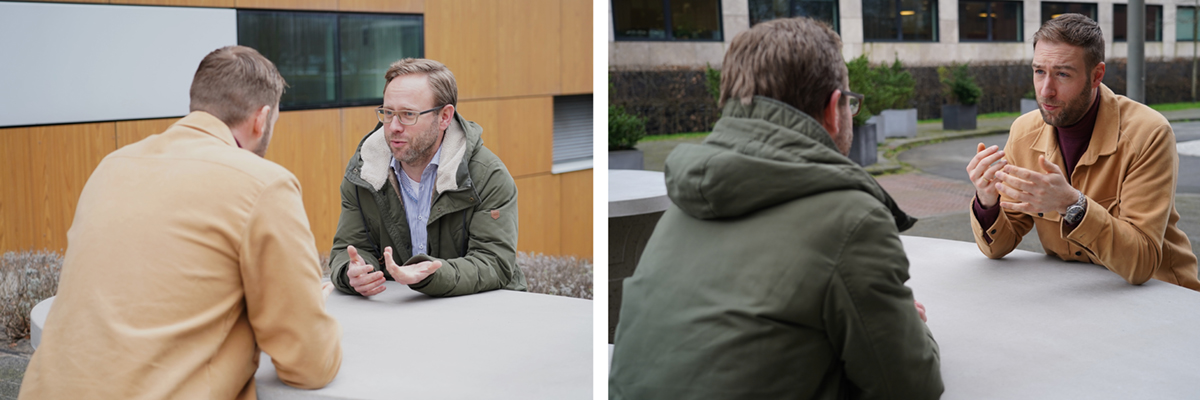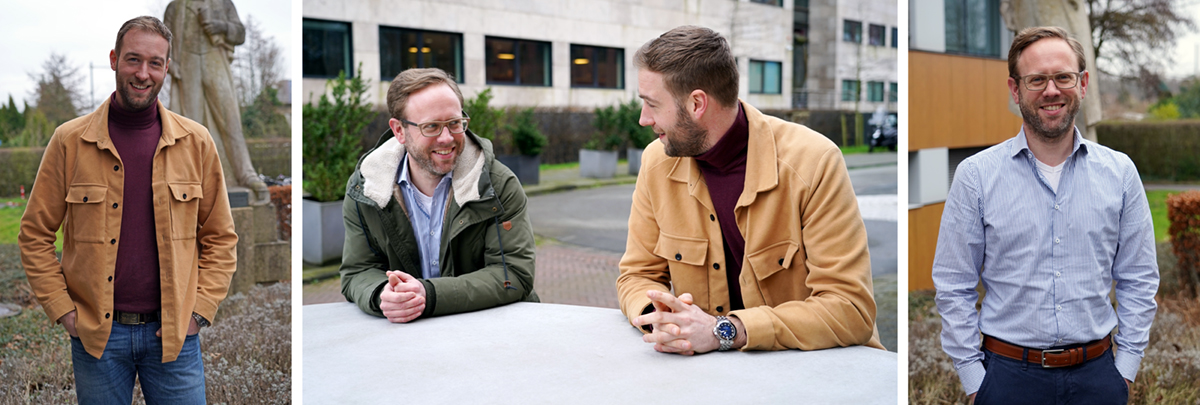JAN TIJMEN NINCK BLOK
Jan Tijmen Ninck Blok studied political science and law, specialising in the Humanitarian Law of War. The knowledge gained comes together in his current position at the Red Cross. There they call him a specialist in Humanitarian Law of War.
BASTIAAN VAN BLOKLAND
Bastiaan van Blokland studied Journalism and Islamic Studies. After that, he held various positions in the media world. Two years ago, he made the switch to the Dutch Red Cross. Here he works as a spokesperson, also known as a press officer.
Reading time 9 minuten
JAN TIJMEN NINCK BLOK AND BASTIAAN VAN BLOKLAND
Why it is important as a Red Cross to be neutral
In a world full of conflict, the Red Cross is known for its neutrality. But what does that mean in practice? Senior legal advisor Jan Tijmen Ninck Blok and spokesperson Bastiaan van Blokland share their insights. While explaining why neutrality is crucial, they also reveal the challenges they face in their work. Especially in times of global attention, such as during the current conflict in Israel and the occupied territories.
Jan Tijmen, what do you do as a 'senior legal advisor' to the Red Cross?
"I am responsible for the content of the Humanitarian Law of War (HOR) on behalf of the Dutch Red Cross. As an association, we have a duty based on international and national regulations to disseminate knowledge about the HOR. In the Netherlands, we do this with a nice network of volunteers, among others. This happens, for example, during lessons at schools or associations. In addition, we supervise the implementation of and compliance with the HOR in the Netherlands and the development of the law at an international level. As a result, the Red Cross is the protector or guardian of the HOR worldwide.
The work and activities of the Red Cross originate from the HOR. The Red Cross and the modern HOR originated from the ideas of Henry Dunant, one of our founders. His main ideas were: there should be a neutral independent aid organization and countries should make agreements about the provision of aid in wartime."
Bastiaan, what do you do as a spokesperson for the Red Cross?
"As a spokesperson, I am in contact with the media. I try to get stories in the press through press releases and contacts with journalists. These stories usually focus on our aid and humanitarian needs. Making a call or sharing a story is often valuable. When the media takes over, it is widely reported that people need help and also what we are doing to help. Sometimes we specifically look for a medium that can share a story, for example the Jeugdjournaal or a magazine. Because the Red Cross is very active, we can approach different media: radio, television, various newspapers and magazines. In addition, our team constantly receives media requests, such as questions from journalists on a particular topic. Then, of course, we will speak to the press representatives."

Bastiaan: "As the Red Cross, we are neutral, but during my work I notice that our role is not always understood. People want us to speak out. Why don't we do this?"
Jan Tijmen: "I think it's important to mention that I understand that very well. Everyone has the right to form an opinion about something. Assessing a situation is human, and one expects the same from a social organisation in the middle of society. As the Red Cross, we are a neutral organisation. On the basis of impartiality, we are there for everyone with our assistance. Our neutrality ensures that we can reach everyone, even during conflicts. As guardian of the laws of war, we discuss rules that apply during war. In confidential conversations with parties involved in a conflict, we express our concerns about alleged violations. Publicly, we will never address a specific situation or blame a party for what happened. In doing so, we remain neutral and maintain the confidence of all parties. For example, we can say that the HOR prohibits the use of chemical weapons and attacks on hospitals. We are not saying that a specific side has violated the laws of war. We will never do that, because then we will lose our neutrality."
"What are the consequences for a conflict if we are not neutral, Jan Tijmen?"
Jan Tijmen: "In the discussions with the parties involved, we also talk about our assistance. In addition to the laws of war, we discuss the necessary humanitarian access to a conflict zone. We need this access in order to be able to provide our assistance, and for that we need security guarantees. When we speak publicly about our interpretation that violations may have been committed, we may lose the trust of the parties. If people lose confidence in the Red Cross because we are not neutral somewhere in the world, this can have direct consequences for the relief efforts in other parts of the world. For example, if parties no longer want to talk to us as a result."
Jan Tijmen:
“If people lose confidence in the Red Cross, it has direct consequences for the relief efforts”
“If people lose confidence in the Red Cross, it has direct consequences for the relief efforts”
Jan Tijmen: "How do we ensure neutrality in our reporting?"
Bastiaan: "Our messages are always clear and factual: we focus on the needs and on our work. Because we receive information from our own association, other Red Cross societies from all over the world and the International Federation of the Red Cross, we always tell our own story. We present what we do and why we do it in the best possible way. At the moment there is a lot of fake news going around, including about the Red Cross. That is sometimes quite difficult. If things aren't true, we'd like to explain how they are. As far as I'm concerned, explaining is very important to gain understanding. As a spokesperson, you can easily answer: 'I can't say anything about that'. But that's not satisfying to hear. In fact, people may think you have something to hide. On the contrary, I explain a lot, for example why we have confidential conversations with parties in a conflict and that this is why neutrality is so important in our work. Then the understanding usually follows automatically for us."
At the moment, there are several conflicts going on in the world. Why are there so many questions about neutrality in the conflict in Israel and the occupied territories and why is it not easy for an organization to say that it is neutral?
Jan Tijmen: "I understand that it can be extremely difficult to remain neutral. When a conflict has a major impact on society, we are expected to speak out. We see, for example, that the conflict in Israel and the occupied territories creates a division between communities. Whether it is Ukraine and Russia, Sudan, Israel and the occupied territories, our neutrality ensures that we deal with all conflicts and parties in the world in the same way. The main goal is to be able to continue to provide our assistance well."
Bastiaan: "In the media, we also notice a difference in the attention paid to a conflict. A conflict that is less prevalent in society raises fewer press questions. Stories are also less often picked up by the press. You can see this, for example, in the current conflict in Sudan, where there is a huge humanitarian crisis. Many people don't know much about this, for exactly this reason. In addition, we have to deal with increasing or decreasing interest in certain subjects. Consider the conflict between Ukraine and Russia. At first, everyone wanted to know everything, and now, two years later, the demand for information is decreasing. Still, you want to keep talking about the work we are doing in Ukraine and surrounding countries, because it is still so desperately needed. We want the public to be kept informed about this. That's how we always try to get and keep topics in the media."
Bastiaan:
“If you explain a lot of things, I often notice that there is understanding”
“If you explain a lot of things, I often notice that there is understanding”

Bastiaan: "As a volunteer or employee of the Red Cross, do you always have to be neutral?"
Jan Tijmen: "You should always apply neutrality in your work for the Red Cross. We do not speak out, in terms of function, but also if you can be linked to the Red Cross. It is also important that you watch your words in your private life. Although that depends on the situation. If you have a social media account that features you wearing Red Cross clothing, our logo is visible, or you mention the Red Cross by name, you must remain neutral in those posts. You also have to be careful with your words on a LinkedIn profile where you mention that you are a volunteer or work for the Red Cross. If you go for a cup of coffee with colleagues after a deployment with your Red Cross jacket still on, you are visibly connected to our organization and you must be neutral. All this to ensure that our relief efforts can continue worldwide. Of course, you can express yourself differently on, for example, your Facebook or TikTok profile, where you are not linked to the Red Cross."
Bastiaan continues: "The news coverage sometimes doesn't sit well with me. I think this is quite a difficult period for our association. Our colleagues from the emergency response teams in conflict areas or the people who are involved with social media on a daily basis see all kinds of images pass by. Then it is sometimes necessary to ventilate. How can we express our opinion without it being detrimental to the Red Cross?" Jan Tijmen: "If you feel the need to talk, you can do so internally with a confidential adviser or your manager. In addition, you can contact colleagues or the Peer Support Team. There is room for different perspectives and to talk."